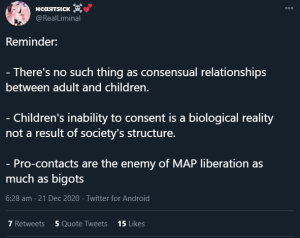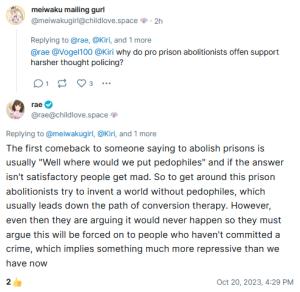One of our staff members is contributing considerably to a News Archiving service at Mu. Any well educated (Masters, PhD or above) users who wish to make comments on news sites, please contact Jim Burton directly rather than using this list, and we can work on maximising view count.
Anti-contact
 | |||||||
| Part of NewgonWiki's series on minor-attracted identities | |||||||
|---|---|---|---|---|---|---|---|
|
| |||||||
| Starting Guide | Community | Pediverse MAP | NOMAP | AAM | Neologisms "MAP" Origins | Flag | Movement Political history: MAP & LGBT Alliances Philias: Ephebo - Hebe - Pedo - Nepio Gender and attraction: BL - EL - GL Pederasty/Gay BL | Korephilia/Lesbian GL Pro-c | Neutral-c | Anti-c BLogo | GLogo | |||||||
|
| |||||||
| Category: Minor-attracted people | |||||||
| Template:MAI - This template |
Anti-contact (or simply "anti-c") is a term used to describe a person - often an MAP or ally, as ethically disagreeing with the idea of minor-adult physical/sexual relations.
This contrasts with pro-c (pro-consent/choice/contact) beliefs, although in reality they exist on a spectrum, with many underpinning themes such as intrinsic harm.[1] Within paraphilia and shipping/fiction circles, the term is used in reference to other inclinations such as Zoophilia.
There are a range of anti-c positions:
- Consequentialist anti-c (c-anti-c [neologistic - suggestion]). In this instance, celibacy is called for in the present climate. Such an individual might maintain they are not presently interested in Age of Consent reform, or consider it a topic of lesser importance. Supporters of very limited reforms might sometimes also self-describe as anti-contact, contact-neutral or pro-reform.
- Anarchist anti-c. Surprisingly, some anti-c's are Anarchists (and thus, anti-prohibitionist). They tend to believe that punitive state norms should be addressed, and that communities are (under the right circumstances) capable of finding a peaceful way of resolving what they believe to be inappropriate relationships between younger and older people.
- Outright-anti-c (o-anti-c [neologistic - suggestion]). Holds that under no present or future circumstance, can any sexual contact between minors and adults be entertained. Usually, said person believes that such actions are ethically or morally wrong, in the absolute. They tend to favor both prohibition and prevention, and may (but not always) exclude pro-c's from their inner-circle. In some extreme cases, they may ask pro-c's to enter therapy.
The 2016 research of Bailey and also Jahnke in 2019[2] would appear to suggest that anti-c beliefs are not related to lower levels of offending. This is most likely because some pro-c positions are relatively moderate and pro-celibacy, while overstated anti-c beliefs can arise as a result of poor self-control and moral guilt.[3] Research might later be conducted to determine whether outright pro-c and outright anti-c beliefs are correlated with high frequency of adult-minor sexual contacts, whilst more moderate pro and anti-c positions are related to non-offending.
Ideology
Anti-contact NOMAP ideology is defined in said article.

Naïvety
Anti-c activists are often accused of being naïve regarding online security, forgoing basic precautions such as preventing others from linking their profiles. They might be prone to assuming that people will accept them for what they are because of their consent philosophy.
While anti-c's haven't been the only ones to make basic errors, online vigilante information-gathering campaigns claim to have exposed the personal details of numerous prominent anti-c activists in 2022 alone.[4] This trend continued into 2023 and 24.
In one instance, a newly recruited social media manager for Virped lost their seven-year old social media account after posting provocative messages concerning a pamphleting campaign. That same year, a person (allegedly a MAP) affiliated with Prostasia Foundation and various other websites involuntarily outed himself to "The Predator Alert" on Twitter.com, resulting in him losing his job at a preschool.
Pro-c online activists who have a history of infiltrating Wikipedia as early as 2004/5 have simply used fake accounts bought with cryptocurrency to stir up media controversies, attracting millions of views without the attendant risks.
Explicitly anti-contact organizations

- Virtuous Pedophiles (other organizations such as B4U-ACT are sometimes wrongly described as anti-c, despite not taking an official position).
- Prostasia Foundation - Technically, this is a charity that provides services to MAPs and not a MAP organization.
- Most SOL Reform organizations such as NARSOL are not seen as actual MAP organizations (since not all RSOs are MAPs and vice versa). SOL Reform Organizations typically focus on registry reform and fairer post-release restrictions.
See also
External links
Anti-c perspectives.
- Why pro-contact pedophile arguments are bullshit (by a pedophile)
- The (not) Reasons I’m Anti-Contact
- Pro-contact and anti-contact pedophiles - Virped
- Pedophiles who don't excuse child sexual abuse - The p word
References
- ↑ Lievesley et al, 2025. "Beyond Pro- and Anti-Contact: Understanding the Ideologies of People Attracted to Children'. See for further information about poor self-control being linked to punitive and self-loathing ideologies.
- ↑ Sara Jahnke & Agustín Malón (2019) How pedophilic men think about adult-child sex: effects of child gender and physical maturity, Psychology, Crime & Law, 25:1, 90-107, DOI: 10.1080/1068316X.2018.1503665
- ↑ Rendina HJ, López-Matos J, Wang K, Pachankis JE, Parsons JT. The Role of Self-Conscious Emotions in the Sexual Health of Gay and Bisexual Men: Psychometric Properties and Theoretical Validation of the Sexual Shame and Pride Scale. J Sex Res. 2019 May-Jun;56(4-5):620-631.
- ↑ "Project Raven"